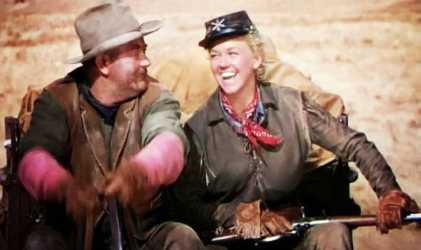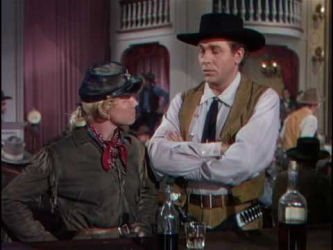I could hardly resist a Doris Day double-feature, even if the ’50s are not my time, and even though this was not the film I was most intrigued to see. (Love Me Or Leave Me was the musical biopic that followed.) The Flower is increasingly tired of the fact that whenever we see one of these movies, the presenters have to point out that Day (or virtually any other female performer) was no shrinking violet, no mere mother and/or housewife, but a strong, defiant character with a lot to say about something or other. I believe, as one who aspires to wife and motherhood, she feels—correctly—that these ritualistic denunciations are meant to denigrate her aspirations.
But we can hardly blame Doris for this. She is absolutely terrific in this fine, if bland, musical romantic comedy where she plays the legendary Calamity Jane who befriends the more feminine Katie Brown (Allyn Ann McLerie) only to lose the apple of her eye, Lt. Gilmartin (Philip Carey) to her. But it all works out because she really loves Wild Bill Hickcock (the great Howard Keel, fresh off of playing the romantic lead in Annie Get Your Gun). And he loves her, smitten as he (and everyone else) is with the fetching Ms. Brown.

Shortly before (or after) killing two (or five) Indians.
Right around 30 at this point, Day is an absolute pistol. She plays a blowhard “Calam” who is both respected and lightly mocked, and is by turns indifferent and offended by her own putative lack of femininity. She, of course, lacks nothing in the way of femininity. Oh, she walks with a nice swagger, she gets her voice down low and she wears buckskins throughout the movie but, no, at no point is it credible that people mistake her for a man. That’s okay, of course: No one is actually meant to. We’re only supposed to suspend belief long enough for her to believe she’s upset (intermittently) by it.
Calamity was no Annie Oakley: Her celebrity in part came from her relationship to Hickok and her various tall tales, though we only have her word that the two were ever married. This, like her alcoholism, has no place in a musical like this, wherein we’re free—nay, encouraged—to believe Keel and Day will live happily ever after. It’s quite charming and one of director David Butler’s better works. (Butler directed scores of movies, including quite a few others with Day, like Lullaby of Broadway and Tea for Two. He would finish up in TV, directing “Leave it to Beaver” and that awful episode of “The Twilight Zone” where the hack writer summons Shakespeare to help him write teleplays.)

“I got to be in BOTH cowgirl movies.”
The music was fine. The best moments (to my ear) was the opening “Whip Crack Away” and the pseudo-meet-cute “I Can Do Without You” where Keel and Day demonstrate their intimate friendship by insulting each other, musically. The song “Secret Love” was a hit for Day and won the film an Oscar but I don’t recall it.
Interestingly enough, I think we all (The Boy, The Flower and I) agreed that the next film was better, but we wished we had seen this one first because it’s fun, light and frothy. Love Me Or Leave Me would be an entirely different beast altogether.

Dolled up.
